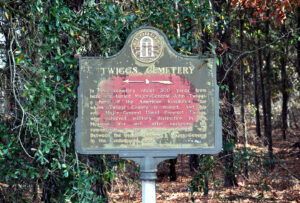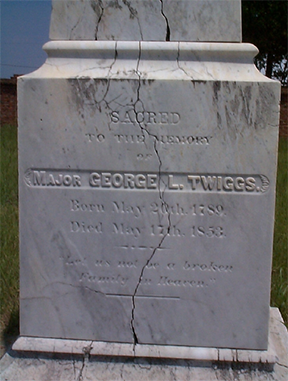Twiggs Cemetery

Currently, the Stallings Island Chapter, NSDAR, is revitalizing the Twiggs Family Cemetery, located in Augusta, Georgia, off Goshen Industrial Boulevard. The family cemetery has the family of Major General John Twiggs, which includes other American heroes. We have just approved and implemented a three-phase plan to get the cemetery where it needs to be with the help of landscape professional Jacob LaMothe.
Major General John Twiggs (June 05, 1750 – March 29, 1816)
By Justin MacEwen, member of the Colonel William Few Chapter, Sons of the American Revolution (SAR)

John Twiggs contributions during the southern campaigns of the American Revolution is often overlooked by historians even though he is noted as the “Savior of Georgia.” A born fighter, Twiggs displayed the character of a dedicated patriot and a skillful combat commander. He began his military career as a young lieutenant in the local Georgia militia assigned to protect Augusta, Georgia.
As the revolution expanded operations within the south, Twiggs would quickly rise through the ranks to achieve a leadership position as a senior major general commanding Georgian militia in the field. From the start of the American Revolution until the end of hostilities, Twiggs personally led fellow Patriots in several major southern battles and numerous skirmishes attacking British troops and American Loyalists in Georgia and South Carolina.
A true combat leader, Twiggs continued experience in the field enabled him to conform to the rigors of an ever-changing battlefield and enemy. His combat experiences include Kettle Creek, Burke County Courthouse, the Siege of Savannah, Midway Meeting House, James Butler Plantation, Lockhart’s Plantation, and the Battle of Blackstock Plantation.
By the time the American Revolution ended, Twiggs had sustained multiple combat injuries and endured long periods of hardship due to campaigning against the British. Twiggs never wavered his requirements and commitment to the cause of American freedom and pursued the British with relentless vigor. His actions were a key part of the American success during the southern campaigns. Twiggs’ obscurity in the historical sense is a true travesty. If we understood the sacrifices he endured and the patriotism he displayed throughout his years of service, we would seek to remember and honor him with a greater sense of affection.
